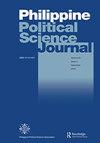灾后人类安全的实现——以海燕寡妇为例
Q3 Social Sciences
引用次数: 6
摘要
2013年11月8日,台风“海燕”袭击菲律宾,夺走了6300多人的生命。许多遇难者都是为了保护家园而没有撤离的人。因此,丧偶是海燕的一个重大和毁灭性后果,但丧偶妇女也是灾难后最被忽视和服务不足的弱势群体之一。本研究中使用的数据来自15次半结构化访谈和三次焦点小组讨论,对象是受海燕影响严重的莱特省三个地区的寡居妇女:塔克洛班市、帕洛和塔纳昂。我们的实地调查发现,虽然提供人道主义援助为幸存者提供了一点人的安全,但寡妇实现人的安全的能力却受到严重削弱和限制。因此,本文的主要研究问题是:“是什么破坏了海燕之后寡妇获得人类安全?”我们认为主要有四个因素:(1)缺乏平等的经济机会;(2) 安置点出现新的风险;(3) 机构无力应对和适应变化;以及(4)缺乏以幸存者为中心的决策场所。为了在未来克服人类安全的这些障碍,我们就作为提供预防和应对服务的主要组织的地方政府单位需要如何做提出了两项关键的政策建议:(1)优先消除搬迁地点现有的经济和社会脆弱性,以及(2)为寡妇及其家人做好应对未来气候冲击的准备。本文章由计算机程序翻译,如有差异,请以英文原文为准。
Achieving Human Security after a Disaster: the Case of the Haiyan Widows
When Typhoon Haiyan struck the Philippines on November 8, 2013, it took the lives of over 6,300 people. Many of those who died were men who did not evacuate in order to protect their homes. As a result, widowhood was a significant and devastating consequence of Haiyan, but widowed women were also one of the most neglected and underserved vulnerable populations in the aftermath of the disaster. The data used in this study were drawn from 15 semi-structured interviews and three focus group discussions with widowed women in three areas in the province of Leyte that were heavily affected by Haiyan: Tacloban City, Palo, and Tanauan. Our fieldwork uncovered that while the delivery of humanitarian assistance provided a modicum of human security to the survivors, the ability for widows to achieve human security was severely reduced and constrained. Thus, the main research question of this paper is: “What undermined the widows from attaining human security after Haiyan?” and we argue that there were four main factors: (1) the lack of equal access to economic opportunities; (2) the occurrence of new risks in the resettlement sites; (3) the inability of institutions to respond and adapt to change; and (4) the absence of survivor-centered decision making venues. To overcome these barriers to human security in the future, we make two key policy recommendations on how local government units, being the primary organizations that deliver prevention and response services, need to do. These are: (1) prioritize the elimination of existing economic and social vulnerabilities in the relocation sites, and (2) prepare the widows and their families for future climate shocks.
求助全文
通过发布文献求助,成功后即可免费获取论文全文。
去求助
来源期刊

Philippine Political Science Journal
Social Sciences-Political Science and International Relations
CiteScore
1.00
自引率
0.00%
发文量
17
期刊介绍:
The Philippine Political Science Journal (PPSJ) is an internationally refereed journal and the official publication of the Philippine Political Science Association (PPSA). The PPSJ welcomes articles dealing with the politics and international relations of Southeast Asia. Manuscripts may focus on individual countries of the region but comparative articles about the countries in the region and the region as a whole are especially welcome.
 求助内容:
求助内容: 应助结果提醒方式:
应助结果提醒方式:


